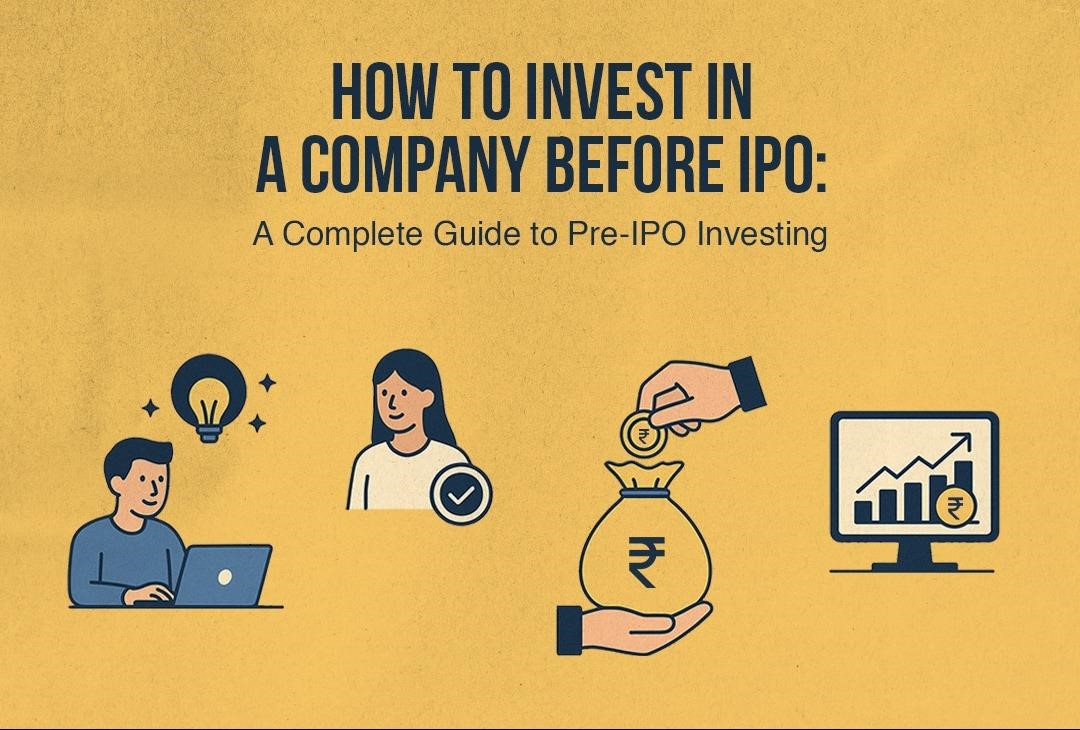Imagine getting early access to the shares of a high-potential company before they become available to the general public on the stock market. That’s exactly what pre-IPO investing offers—an opportunity to invest in promising businesses during their growth phase, well before they go public.
Buying listed stocks has become incredibly common because of the rise of investment apps and user-friendly platforms.
In this blog, we’ll walk you through the key things to know about pre-IPO shares-
- What pre-IPO shares are and how they work
- The advantages & risks of investing in pre-IPO shares
- How to buy pre-IPO stocks in India
What is Pre-IPO Investing
Pre-IPO investing means buying shares of a private company before it goes public through an Initial Public Offering (IPO) and gets traded on the stock exchange.
These shares are known as Pre-IPO Stocks. Companies usually offer pre-IPO shares to acquire funds for product development or business expansion.
For investors, it’s an exciting chance to buy shares at a lower price before they potentially increase in value once the company goes public.
Many investors are drawn to pre-IPO opportunities because IPOs can be highly competitive, and in cases of oversubscription, not all applicants receive an allocation. By investing early, you can avoid this risk and secure your shares.
With the new rules around dematerialization of shares, it’s now easier to buy, hold, and transfer IPO stocks between demat accounts.
How Can You Buy Pre-IPO Shares?
There are two main ways to invest in pre-IPO shares, depending on whether you’re purchasing newly issued shares or existing ones from current stakeholders.
1. Primary Pre-IPO Offering (Private Placement)
Here, the company issues new shares to a limited group of investors (such as venture capitalists, angel investors, or high-net-worth individuals).
The price and terms of these shares are set by the company or its underwriters. Investing in this way allows you to get in early at potentially favorable terms, but you must be among the selected investors.
2. Secondary Sale of Unlisted Shares
This involves buying pre-existing shares from current stakeholders , typically through intermediaries like brokers or unlisted share platforms.
- You’re not giving money to the company – you’re buying someone else’s stake.
- Prices are influenced by demand, company valuation, and market sentiment.
3. AIFs With Pre-IPO Exposure
Alternative Investment Funds (AIFs), mainly those under Category II, can invest in companies during their pre-IPO phase. This gives investors a chance to access unlisted companies before they go public.
Want to know more about pre-IPO investing, get regular updates, and invest through an experienced intermediary? Moolaah can help you.
And here’s the bonus—you also get wholesale pricing, even if you’re investing in small quantities.
Benefits of Pre-IPO Investing
Pre-IPO investing has been gaining attention — and for good reason. Here are some compelling benefits that make it worth considering.
- Early Access to High-Growth Companies: Get into promising businesses before they go public. Investing at this stage lets you be part of their journey from the start.
- Attractive Valuations: Pre-IPO shares are often priced lower than their IPO value, giving early investors a potential edge in terms of cost and long-term gains.
- Potential for High Returns: If the company performs well post-listing, early investors can benefit from strong capital appreciation — often more significant than post-IPO buyers.
- Portfolio Diversification: Pre-IPO shares don’t move in sync with listed equities, so they can add a layer of diversification to your portfolio.
- More Stable Pricing: Unlike listed stocks that react to daily market sentiment, pre-IPO shares are typically less volatile
- Strong Institutional Interest: Many pre-IPO companies attract investments from large institutions and venture capital firms- a sign of confidence in their growth potential.
- Networking Opportunities: Investing in pre-IPO companies allows you to connect with founders, investors, and key industry players, opening doors to future investment and professional opportunities.
Risks of Investing in Pre-IPO Stocks
- Limited Liquidity and Lock-Up Period: Pre-IPO shares are illiquid and hard to sell quickly if you need money. Additionally, these shares often come with a lock-up period, meaning investors can’t sell their holdings for a specified time after the company goes public.
- Risk of Company Failure: There’s no guarantee that every company will succeed or eventually go public.
- Lack of Transparency: Private companies don’t have the same disclosure requirements as public companies, which means you might not have access to crucial financial data to make fully informed decisions.
While pre-IPO investing carries risks, like any high-return opportunity, the market shows promising potential.
In recent years, India has witnessed a remarkable surge in retail investing – with mutual funds and the stock market hitting record highs. As more investors explore new ways to build long-term wealth, there’s growing interest in alternative asset classes that offer better returns.
In fact, pre-IPO shares delivered an impressive 27.68% return in 2024, outperforming both Nifty 50 and Sensex – with some individual unlisted stocks offering gains of over 50%.
Also, in 2024, around three-fourths of IPOs debuted with gains, with renewable energy and tech companies standing out as top performers.
Selling Options for Pre-IPO Shares
Once you own pre-IPO shares, the next big question is – when and how should you sell them? Common approaches investors take to sell pre-IPO shares include,
Hold for Long-Term Growth: If you trust the company’s potential, holding your shares post-IPO could lead to significant gains as the company continues to grow. You may choose to sell when the share price reaches your target or aligns with your financial goals.
Sell After the Lock-Up Period: After the lock-up period ends, you have the option to sell your shares. You can choose to sell right away or wait, depending on the market conditions, the company’s performance, and your financial goals.
Company Buyback: Some companies may offer to repurchase pre-IPO shares at an agreed-upon price before going public, giving you the chance to liquidate your investment (Not common, and depends on company’s financial strategy and regulatory approvals).
Key Considerations Before Investing in Pre-IPO Shares
Pre-IPO investments can be rewarding, but they come with risk as we mentioned. Before putting your money in, make sure you understand these critical factors.
Liquidity
Pre-IPO shares come from unlisted companies, which means they don’t have regular market transactions. Buying or selling these shares relies on brokers, and the process can be slow if there are fewer buyers or sellers. This makes long-term investment a common choice for pre-IPO investors.
Company Fundamentals
Even though unlisted companies may not disclose much information, it’s important to gather data on their financial health and growth prospects. Websites like the Ministry of Corporate Affairs (MCA) or brokers’ platforms can offer valuable insights. Checking news and media outlets will also help you understand the company’s status and potential.
The Likelihood of Going Public
Companies closer to a public listing have a greater chance of creating value for investors. A company with a high likelihood of being listed can offer more liquidity, and selling these shares after they’re listed is usually more advantageous from a tax perspective.
Tax Implications
Profits from unlisted shares are subject to different tax rules compared to listed ones. It’s crucial to understand the specific regulations before investing in pre-IPO companies.
Ready to Buy IPO Shares?
Getting in early on a company before it goes public can be exciting, but it’s not as simple as clicking ‘buy.’ Here’s how you can approach buying pre-IPO stocks through an institution/broker.
1. Identify Pre-IPO Opportunities
Look for platforms that list pre-IPO stocks, including startups, emerging unicorns, or late-stage private companies.
2. Do Your Due Diligence
Research thoroughly before investing. Understand the company’s financials, business model, and growth potential to assess the risks and opportunities.
You can also reach out to a trusted broker to learn about available pre-IPO shares and their details.
3. Find a Trusted Broker
It’s always best to buy IPO shares through trusted brokers or institutions with a long-term track record in handling IPOs.
While the documentation process may vary, the general procedure is as follows-
- Discuss Quantity and Price: Discuss and agree quantity and expected price of the desired pre-IPO shares with a representative/ broker.
- Offer Letter & KYC: Receive the offer letter and complete the KYC process, including PAN, Aadhaar, cancelled cheque, and Client Master List (CML).
- Acceptance: Accept the offer on the same day to lock in the quantity and rate.
- Payment: Transfer the payment as per the agreed price and time, and share the payment reference ID.
- Transfer of Shares: The broker will initiate the transfer of shares to your Demat account as per the discussed TAT and notify you via email, WhatsApp, or phone call.
Note: The specific steps may vary depending on the broker or institution. Try to work with brokers who have a physical presence (offices) and a dedicated team to support customers. Brokers offering unusually low prices may not always be legitimate.
Only invest a portion of your overall portfolio in pre-IPO opportunities. Consider them as high-risk, high-reward instruments.
Pre-IPO investing isn’t reserved for only big players anymore. If you’re well-informed and work with the right people, it can be a smart way to diversify and grow your money.
Focus on companies with strong track records and clear IPO pipelines, partner with reliable intermediaries and, most importantly, conduct your own research before investing.
Want to know more about pre-IPO investing, get regular updates, and invest through an experienced intermediary? Moolaah can help you.
Why Invest in Pre-IPO Stocks with Moolaah?
Moolaah connects you to exclusive pre-IPO opportunities, giving you a chance to invest early in high-potential pre-IPO businesses.
- Access exclusive deals – Invest in some of the best opportunities in the market
- Competitive pricing – Get shares at fair market rates
- In-depth stock insights – Access detailed research reports and analysis on unlisted shares to make informed investment decisions
- Same-day delivery – Receive your pre-IPO shares in your demat account on the same day, depending on stock availability
- Timely IPO alerts – Stay updated on upcoming IPO launches
- Wholesale pricing – Enjoy wholesale pricing in retail quantities
Pre-IPO investing isn’t just about spotting the right opportunity, it’s also about having the right partner by your side. With the recent buzz around pre-IPO stocks, there’s a real risk of falling for fake deals and losing money.
That’s where Moolaah comes in. We’re an experienced intermediary who brings structure, clarity, and trust to your pre-IPO journey. From verifying deals to handling documentation, pricing, and share transfers, we take care of the process so you can invest with confidence.
Start investing with Moolaah today to explore high-growth pre-IPO opportunities and maximize your returns by investing early.





